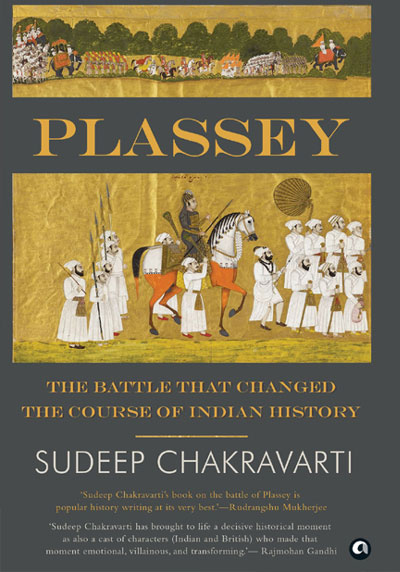Court and Conspiracy
Espionage played a key role in setting the scene and the pace for Plassey -- and, in helping Clive to make up his mind and press for action from Admiral Watson and the Calcutta Council. The Company encouraged intelligence gathering. A Consultation in Calcutta on 1 February 1753 actually records such encouragement. Alongside cutting trees on roads, clearing and repairing the ‘tank’ at what would become Dalhousie Square, orange trees for the park, a whimsical expense of 9 paise for ‘Govind Chand’s Cat’ -- I was unable to trace the purpose -- and purchase of confiscated belongings of prostitutes at public auction or ‘outcry’, the Council also listed 10 rupees 12 annas and 6 paise towards ‘the Mores employed for secret services’.
Indeed, one of the great concerns at Fort William after the recapture of Calcutta in early 1757 was that the cipher used to communicate with Watts and Scrafton had been compromised. We learn from Orme and a record in Hill’s Bengal that the cipher, in which letters were transposed with numbers, went like this: a: 19 b: 15 c: 27 d: 30 e:20 f: 39 g: 28 h: 18 i: 38 k: 33 l: 16 m: 29 n: 32 o: 23 p: 25 q: 37 r: 34 s: 31 t: 24 u: 35 w: 22 x 17 y: 26 z: 36 &: 21
Double letters were represented by using the number 4, And the Roman ‘I’ could imply a stop ‘where necessary to avoid mistaking the sense’.
Some capital letters signified key players and places. A was used for Watts, D for Mir Jafar, B for Umachand, C for Siraj, G for the French, E for Murshidabad and F for Qasimbazar.
Clive himself would write to the Court in London in August 1757:
Some of Suraja Dowla’s letters to the French having fallen into my hands, I enclose a translate of them just to show you the necessity we were reduced to of attempting his overthrow.
Reverend Long reproduced several of the letters Siraj wrote the French that would come into the Company’s possession. Here’s one Siraj is believed to have written to Charles Joseph de Buss, the commander of Pondicherry, in the second half of February, just days after signing the Treaty of Alinagar with the British. A time when the next tactical step as being argued by Clive & Co was an expedition up the Hugli to Chandannagar:
Suraja Dowla to the exalted in station, greatest among great Officers, the support of friendship, Monsr. Busie, Bahadre.
These disturbers of my country, the Admiral and Colonel Clive, Sabut Jung, whom bad fortune attends, without any reason whatever, are warring against...Monsr. Rennault, the Governor of Chandernagore. This you will learn from his letters. I, who in all things seek the good of mankind, assist him in every respect, and have sent him the best of my troops that he may join with them and fight the English, and if it becomes necessary I will join him myself. I hope in God these English, who are unfortunate, will be punished for the disturbance they have raised. Be confident. Look on my forces as your own. I have written y
Subscribe To Force
Fuel Fearless Journalism with Your Yearly Subscription
SUBSCRIBE NOW
We don’t tell you how to do your job…
But we put the environment in which you do your job in perspective, so that when you step out you do so with the complete picture.








